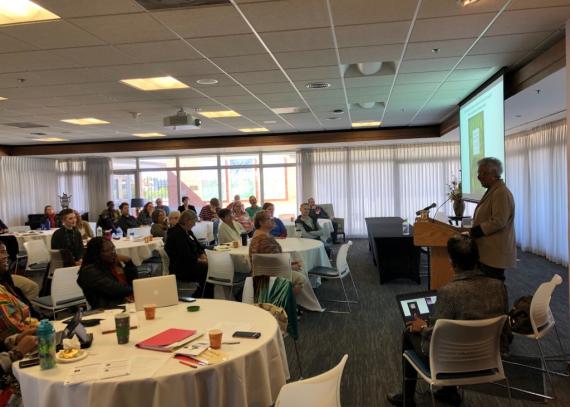Educator Workshops

Teaching the Unexpected Caribbean Workshop
The University of Kansas Center for Latin American and Caribbean Studies, a U.S. Department of Education designated National Resource Center, hosted “Teaching the Unexpected Caribbean,” a professional development workshop open to all K-12 school professionals, in October 2018. The one-day (6 PD) workshop challenged educators to learn about the “unexpected” ways in with the Caribbean, including all of its people and the diverse cultures and histories, has influenced the world. Most importantly, the workshop aimed to show how the Caribbean connects to the Midwest and how Caribbean art and literature can be incorporated across the disciplines. The content was provided to teachers using the lens of Culturally Responsive or Relevant Pedagogy; all activities challenged teachers to rethink methods and curriculum while being aware that they teach students who are culturally, linguistically, and economically different than themselves. This workshop embodied CLACS’ mission to create inclusive learning environments.

Educators discuss a painting by Haitian painter Ulrick Jean-Pierre during their workshop.
Prepares Teachers
The workshop prepared teachers 1.) to utilize digital humanities resources in the classroom; 2.) to design culturally appropriate primary and secondary research projects; 3.) to teach about Caribbean popular media, art, film, and literature 4.) to teach about social engagement, socio-cultural life, and human agency in the Caribbean; and 5.) to encourage student self-determination through meaningful and relevant cultural projects.
The workshop was made possible by the U.S. Department of Education National Resource Center grant and organized by the the Association of Caribbean Women Writers & Scholars (ACWWS) and the University of Kansas Institute of Haitian Studies, Center of Latin American & Caribbean Studies, Kansas African Studies Center, Department of African and African American Studies, Department of English, and Department of Women, Gender and Sexuality Studies. The federal grant and KU campus support enabled the workshop to be offered at no cost for teachers. They were provided free parking, continental breakfast, refreshments, and a lunch buffet. Teachers also received free copies of The Gospel of Treesby Apricot Irving and The Farming of Bones and Mama’s Nightingale by Edwidge Danticat.
The workshop was designed to take advantage of the Unexpected Caribbean Symposium.

Educators engage with Amanda Martin-Hamon, the Spencer Muesum of Art’s Assistant Director of K-12 Education, in The Ties the Bind.
Guided Tour
Teachers were given a guided tour of Ties that Bind: The Art of Ulrick Jean-Pierre from a Comparative Perspective, which was on display at KU’s Spencer Museum of Art during Fall 2018 and featured 12 artworks by Jean-Pierre along with select works from KU’s Mary Lou Vansant Hughes Haitian art collection, including pieces by Rigaud Benoît, Wilson Bigaud, Charles Ermistral (Thialy), Max Gerbier, Edith Stephane. Celka Straughn, Andrew W. Mellon Director of Academic Programs and Amanda Martin-Hamon, Assistant Director of K-12 Engagement for the Spencer Museum of Art, led the tour that revealed the deep historical connections between Haiti and the U.S. Amanda and Celka demonstrated how to lead students in critical discussions about significant themes found in artworks that have defined the relationship between Haiti and the United States, including migration, religion and spirituality, the fight for liberty and freedom, and women as leaders. They stressed that artworks can be wonderful primary texts with which to learn about key historical moments and figures that have defined the United States, as well as issues that continue to impact residents of both nations, including race, equity, gender, immigration and refugee rights, and the freedom of religious expression.

Educators attend a keynote lecture by Dr. Daryl Cumber Dance.
Keynote and Plenary Lectures
Teachers also attended keynote and plenary lectures by: Apricot Irving, author of The Gospel of Trees (2018); Crystal Andrea Felima, a cultural anthropologist and digital humanist; and Daryl Cumber Dance, Professor Emerita of English at the University of Richmond and Virginia Commonwealth University. In addition, Dr. Felima and Dr. Dance, accompanied by subject experts in Caribbean literature and media, worked with teachers in small group settings to develop strategies for incorporating Caribbean content into K-16 classrooms. Teachers were introduced to digital humanities resources and were shown how to guide students to use digital tools to create projects that improve primary and secondary research, data curation, social engagement, socio-cultural life, human agency, and self-determination. The small groups discussed curriculum ideas and worked collaboratively to create lessons in subject areas such as art, film, language arts, social studies, history, and more.

Educators work in small groups.